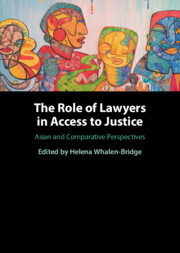Book contents
- The Role of Lawyers in Access to Justice
- The Role of Lawyers in Access to Justice
- Copyright page
- Dedication
- Epigraph
- Contents
- Figures
- Tables
- Appendices
- Contributors
- Foreword
- Acknowledgements
- Abbreviations
- 1 Understanding and Comparing Access to Justice
- Part I Access to Justice in Asia
- 2 Pro Bono, Legal Aid, and the Struggle for Justice in China
- 3 Access to Justice in India: Managing Multiple Mechanisms in a Restrictive Practice Environment
- 4 Access to Justice in Indonesia: Searching for Meaning
- 5 Access to Justice and Lawyer Independence in Japan
- 6 Improving Access to Justice in Malaysia: Introspection, Purpose, and Dynamism
- 7 Political Lawyers and the Legal Occupation in Myanmar
- 8 Alternative Lawyering versus Pro Bono in the Philippines: From Challenging an Authoritarian Government to Working with the State
- 9 Access to Justice in Singapore: A Government and Lawyer Dynamic
- 10 Public Interest Lawyering in South Korea: Standing on the Shoulders of Giants
- 11 A Hub, a Knot, and a Powerhouse: The Legal Aid Foundation and Access to Justice in Taiwan
- 12 Lawyers and Democratic Centralism in Vietnam
- Part II Comparative Perspectives on Access to Justice
- Index
3 - Access to Justice in India: Managing Multiple Mechanisms in a Restrictive Practice Environment
from Part I - Access to Justice in Asia
Published online by Cambridge University Press: 29 September 2022
- The Role of Lawyers in Access to Justice
- The Role of Lawyers in Access to Justice
- Copyright page
- Dedication
- Epigraph
- Contents
- Figures
- Tables
- Appendices
- Contributors
- Foreword
- Acknowledgements
- Abbreviations
- 1 Understanding and Comparing Access to Justice
- Part I Access to Justice in Asia
- 2 Pro Bono, Legal Aid, and the Struggle for Justice in China
- 3 Access to Justice in India: Managing Multiple Mechanisms in a Restrictive Practice Environment
- 4 Access to Justice in Indonesia: Searching for Meaning
- 5 Access to Justice and Lawyer Independence in Japan
- 6 Improving Access to Justice in Malaysia: Introspection, Purpose, and Dynamism
- 7 Political Lawyers and the Legal Occupation in Myanmar
- 8 Alternative Lawyering versus Pro Bono in the Philippines: From Challenging an Authoritarian Government to Working with the State
- 9 Access to Justice in Singapore: A Government and Lawyer Dynamic
- 10 Public Interest Lawyering in South Korea: Standing on the Shoulders of Giants
- 11 A Hub, a Knot, and a Powerhouse: The Legal Aid Foundation and Access to Justice in Taiwan
- 12 Lawyers and Democratic Centralism in Vietnam
- Part II Comparative Perspectives on Access to Justice
- Index
Summary
India currently has the largest number of poor persons in the world, as well as the largest illiterate population, which creates tremendous challenges for access to justice. While free legal aid is a fundamental right for indigent litigants in India, accomplishing this standard remains elusive, and the system struggles with poor-quality state-empanelled lawyers and other challenges. There is also considerable emphasis on dispute settlement through alternative means such as lok adalats, where there is no legal aid. Although the bar calls itself a noble profession, giving back to society is not something the legal profession feels duty bound to do, and pro bono or low bono lawyers remain few and intermittent. Legal aid clinics in law schools could play a key role in this environment, but they are fettered by stringent practice rules which prevent teachers or students from assisting and representing clients. Access to justice could be enhanced if the quality of state-empanelled lawyers is improved, the appropriateness of lok adalats is considered in a more nuanced manner, and barriers to law school clinics are removed.
- Type
- Chapter
- Information
- The Role of Lawyers in Access to JusticeAsian and Comparative Perspectives, pp. 39 - 55Publisher: Cambridge University PressPrint publication year: 2022



